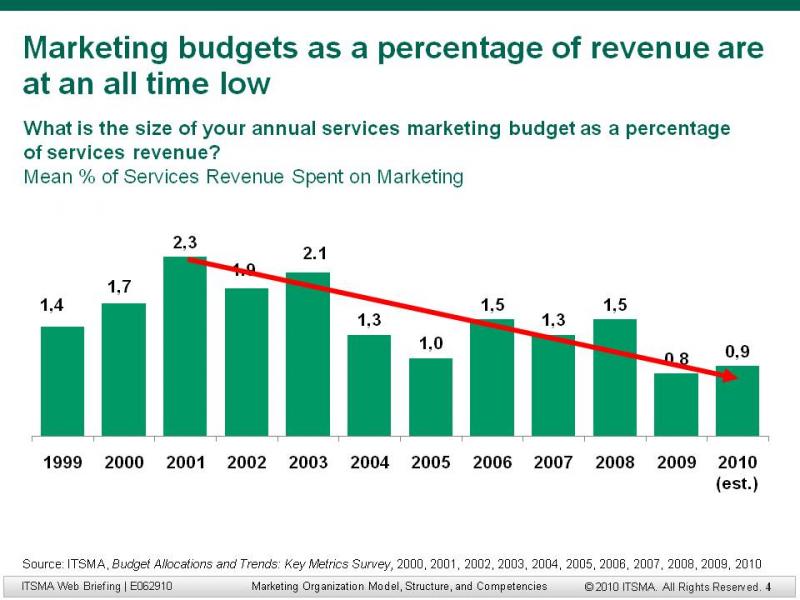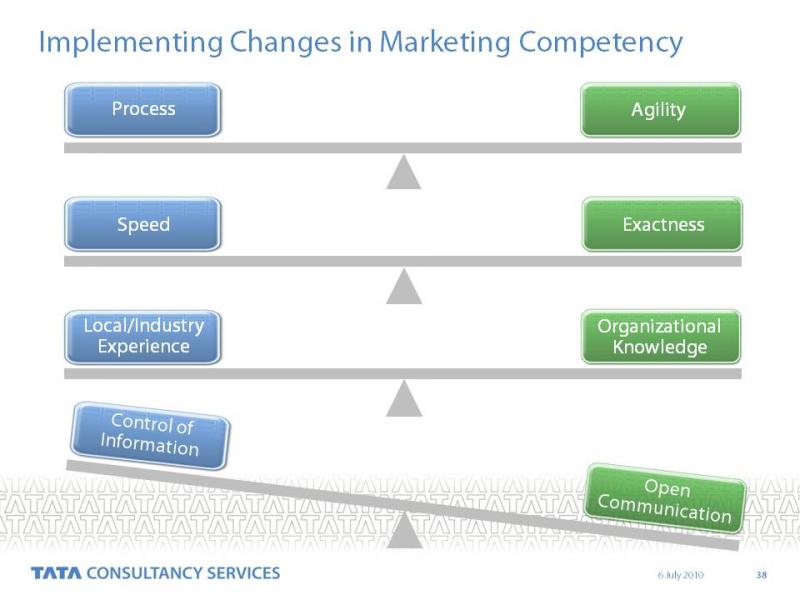Highlights Of Recent ITSMA Webinar On New Marketing Organization And Competencies
By Peter O'Neill
Last week, in addition to presenting at my quarterly Forrester Teleconference, I spoke at a Webinar hosted by the IT Services Marketing Association (ITSMA). I was in illustrious company: David Edelman, partner for the marketing and sales practice at McKinsey; John Lenzen, VP and global head of marketing at TCS; plus our host, Richard Seymour, managing director at ITSMA EMEA. We talked about the emerging organization model and competencies for marketing organizations in the tech industry.
Richard opened with this really interesting data slide, which shows that service providers are actually reducing their marketing spend in a dramatic fashion (see below).


Our recent survey confirms the 2010 increase in marketing budgets and reveals much more about how service provider marketing differs from other industries (see this report). Richard then listed some of the challenges that marketing is facing and postulated that “marketing has to change.”
David talked about the impact of the digital marketing challenge and discussed four critical questions that marketers should be asking themselves:
- Are you aligned to orchestrate the experience journey?
- Are you organized and budgeted to build brand relationships as owned, earned, and personal media channels supplant paid ones?
- Do you have an explicit content supply chain strategy and management approach?
- What is your portfolio of intelligence engines? And is “listening” translating into actions that drive advantage?
My focus, as you would expect, was on the relationship between global marketing plans and the needs of field marketers. I discussed how tech marketers do their marketing localization and gave some best practice examples. And, of course, I also described my idea of field marketing adopting the “marketing concierge” role, while reiterating that global marketing must morph from their governance focus (“brand integrity police”) to assuming a more integrative role of service provider within the corporation — our “hub-and-spoke” concept at Forrester.
Now, one of the things about being an analyst is that you get to make these grand, visionary statements, and everybody sees them as rather insightful, but they also agree that nobody is quite there yet. I couldn’t believe my ears when John laid out exactly that organizational structure within TCS marketing. Corporate marketing is the hub for consolidating processes while there are spokes with authority in the business units and in the field. The one sentence I noted in awe was "corporate marketing shouldn’t exist if it doesn’t provide a service.” And look at this slide where the emphasis is placed on “open communication”:


I still hear so many marketing executives stating, “We are wary of social media because it means that everybody in the company can post their views, unregulated!” Well, in my view, TCS has got it exactly right. We need to trust out colleagues more. After all, it is not that they don’t meet customers already – in fact, they probably meet customers much more often than corporate marketing staff do!
We are working on a new report which discusses the new role of tech industry marketing. The tech industry has now matured, and marketing should no longer be communicating product differentiation; it should BE the difference. As far as we are concerned, marketing must move from educating the customer to accept the product to interacting with customers to solve their problems; we may well call it "customer enablement." Of course, all of our reports are based on conversations with you practitioners, so please feel free to give me your input even as I write the report.
What do you think?
Always keeping you informed! Peter